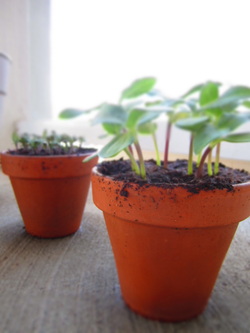
A garden, no matter how small, poses a unique challenge and opportunity to its keeper. The end goal, of course, is cultivating fruitful plants: juicy tomatoes and savory herbs to enhance one’s cooking and sunny flowers to smile up at you when the going gets tough. However, you cannot just drop some seeds in a pot, add dirt, water periodically, and wait for them to grow. Growing a garden requires a particular attentiveness. Shades of green indicate the plant’s over-, under- or adequate watering. Dead leaves must be removed. The seedlings must spend sufficient time in the light and sufficient time in the shade. Even then, beyond ensuring the circumstances are ideal and you are providing what your garden requires, you must wait, let time take its course. If you poke in the soil to see if the seeds you’ve planted have begun to spout, you risk exposing them to the elements while they’re most vulnerable. If you water them excessively with the hope to hasten their growth, you might unearth and drown them. If exposed to the sun the whole day (just photosynthesize already!!), they whither and die. You find yourself, therefore, tragically and incontrovertibly powerless in the face of time. You’ve done all you can to cultivate your garden; the rest is left to fate, the efficient cause of the plant, God, the seed’s biological imperative to survive and propagate itself… pick your Power!. The point is, it’s out of your hands.
Why be coy? The metaphors we can draw from gardening and agriculture are perhaps some of the earliest to which we’re introduced, even as children (note: magic beans lead to trouble; Johnny Appleseed was the man!), and philosophy and theology have long employed them as parallels to the human experience of physical, intellectual, and spiritual growth. We’ve had all of this hammered into our heads since sixth grade when we learned what a metaphor is, but simply intellectualizing it cannot bring forth the fruit that one’s individual practice of gardening yields. Go plant something! Cultivate a garden, cultivate wisdom. :)
~ KS
 RSS Feed
RSS Feed